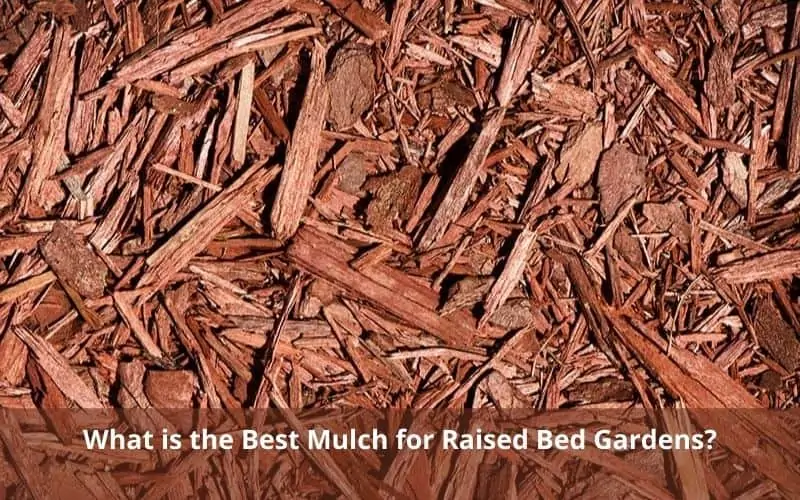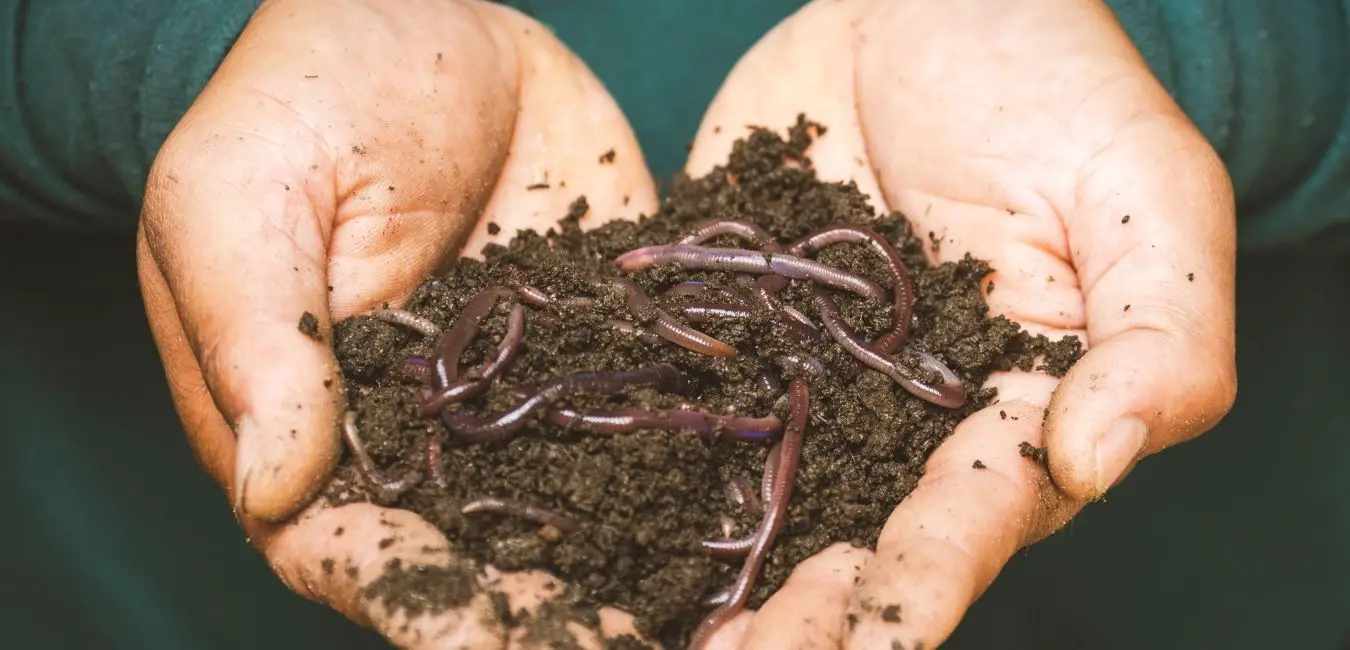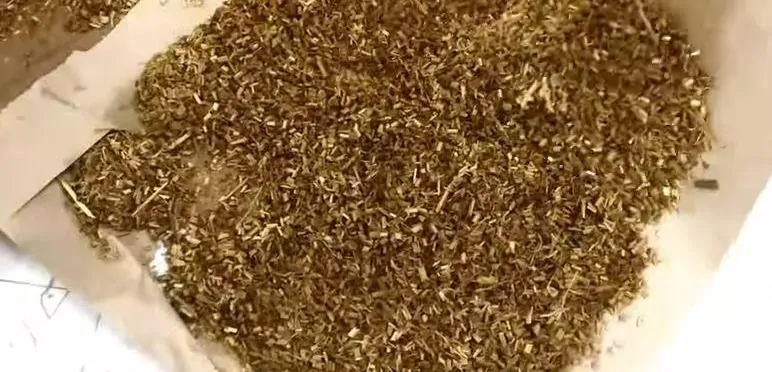Mulching is an essential part of garden and lawn care. We use different types of materials to cover the ground around a plant. The material used to do so is called Mulch. The main function of Mulch is to prevent weed growth. Other than this we use a mulch to increase temperature and moisture in the soil. It also increases the amount of nutrition in the soil after decomposition. We know it is important to use mulch but which one to use. Do you know what is the best mulch for raised bed gardens? We will discuss all of these in today’s article.

Check out my previous post: Midnight Wine Weigela Care: Everything To Know
What is Mulch?
Any material that can prevent overheating of the soil and retain moisture can be termed Mulch. It is useful to prevent the growth of unwanted weeds and grass. Good quality mulch can help increasing soil temperature, especially during cold winter.
Usually, we spread one or more layers of such materials to cover the area around the plant. The soil surface is covered leaving enough space for watering and fertilization.
Mulch can suppress grass and weed germination. It can absorb sunlight and prevent it from roasting the topsoil. Different types of Mulching materials are available in order to fulfill specific tasks like water retention, temperature growth, and combined nutrition.
Types of Mulch
Typically there are two specific types of Mulch available to choose from. The First is Organic mulch and another is inorganic or Synthetic mulch.
Organic Mulch
Organic Mulch is mainly materials of plant origin. Anything that is related to a plant can also be used as mulch.
In other words, we can say that most of the biodegradable materials can become Organic Mulch. You just have to use these to cover the soil in your garden. These materials are biodegradable, which means you have to replace them after some time.
Some of the commonly used organic mulch are-
- Grass Clippings
- Dry Leaves
- Straw or Hay
- Grain Husk (Rice, Oat or Wheat)
- Pine Needles
- Saw Dust
- Coco peat and Coco Coir
- Wood Chips and Barks
- Compost and Manure
Inorganic Mulch
Any Manmade material mostly non-biodegradable that can be used to cover soil is a potential Inorganic mulch. These materials are non-biodegradable which can last for multiple seasons in the garden.
They are sturdy and durable but don’t allow any water or air to pass. The limited permeability is a drawback of Inorganic mulch, especially during the summer season. These mulching materials can make significant changes in the winter garden. It can easily keep soil temperature 3 to 5 degrees higher than the air temperature. This small difference can save your plants from winter frost.
Common Inorganic Mulching Materials are-
- Black Plastic sheet
- Landscape Fabric
- Rubber pads
- Stone pebbles and Marbles
- Paper and Cardboard
Pros & Cons of Mulch
| Pros of Mulching | Cons of Mulching your Raised Bed Garden |
|
|
Is Organic Mulch better than Inorganic Mulch?
Most Probably yes, Organic mulch is better than inorganic mulch. Actually, this is not that simple to answer. Different types of mulch are useful in different situations.
Both organic and Inorganic mulch have their specific pros and cons. It is a fact that all of them are effective with a special impact on their surrounding.
Organic mulch is eco-friendly and cost-effective. But they get decompose quickly and also attract many pests. So they are useful when you need something to nourish the soil with protection.
On the other hand, Inorganic mulch can be costly yet it can stay intact for several growing seasons. They don’t allow pest growth but can trap excess moisture and heat.
Overall, you should prefer organic mulch as it is eco-friendly, cost-effective, and easily available. These advantages are worth considering if you are an organic gardener.
Also read: How to Maintain perfect Compost to soil ratio?
What is the Best Mulch for Raised Bed Gardens?
I always prefer Organic Mulch for my raised beds gardens. To be specific Wood chips, straw, rice husk, cocopeat, and Compost are my best choice.
Generally, I don’t need plastic wrap or anything like that. Winter in my zone is not very cold so organic mulch is good to use.
There is no perfect choice, you can definitely choose anyone. Start with the price and availability then go for the plant’s requirements. After all, price does matter. Spending 100s of dollars to get vegies worth only a couple of bucks is not a good decision. Therefore read everything carefully then act wisely.
Grass Clippings
The grass clipping is easily available and is very cost-effective. In fact, you can get it for free most of the time. It is advised to use grass clipping after drying them for few days. You can use it fresh and green although it will smell really bad. In fact, the decomposition of green matter can drop the ph level of the soil quickly within a couple of days.
Therefore it is effective in making the soil acidic. But avoid using fresh green mulch in the live plants. Instead, put it in the raised bed 2 weeks before any plantation.
Dry Leaves
Dry leaves are a light and effective source of quality mulch. It can prevent weed growth and also nourish the soil after decomposition.
Straw or Hay
Straw or hay is a good alternative for mulching. These materials are light and permeable. So they are healthy for the soil. They can retain moisture for a long duration and this can cause pests attacks sometimes.
Also these stray and hay can contain seeds of unwanted plants. Eventually, if you leave it unnoticed then these materials can sometimes increase the weed growth instead of controlling it.
Overall in proper guidance, these materials are light and effective for mulching in raised beds.
Grain Husk (Rice, Oat or Wheat)
These are the lightest among all mulching materials. If you want to cover the soil with something light and healthy then this is the perfect option. You can collect these from the granary or any cattle food store. It will cost you some buck but it is worth investing.
They get decomposed quickly so refill the soil once in 40 days with the grain husk. Also, check for any live seeds as they can contain paddy or rice seeds. Eventually, they will sprout but have a look and remove them as soon as you find one.
Pine Needles
These are brown organic mulch ideal for slopes. They decomposed slowly and doesn’t wash away with water flow. So they can provide protection against weed growth and also feed the plant with a slow nutrition supply.
Saw Dust
Fine powder sawdust is an effective mulch for the raised beds. Although it can get soggy, if used carefully it can save a lot of water otherwise used for gardening. It is not very light and can make the soil acidic. Therefore use it with care.
Coco peat and Coco Coir
Both coco peat and coir are the best mulching material for any raised bed. They decompose very slowly and can retain moisture for a long duration. Also, they can absorb heat to keep the soil warm. they are easily available in any garden store at a very low cost.
Wood Chips and Barks
Wood chips and barks are available in different shapes and sizes. They can retain enough moisture to hydrate the soil for a couple of days. It also nourishes the soil by slowly releasing nutrients after decomposition.
They can attract some pests so keep a close eye on the sanitation of the soil around the plant. Overall, wood chips are cost-effective, easy to use, and easily available as mulch.
Check out: Is dog poop good fertilizer-How to compost it?
Compost and Manure
The decomposition of any organic matter will create compost or manure. therefore it is the ultimate form of most if organic mulching materials.

It is the best option for weed control along with fertilization of the soil. The compost starts releasing nutrition directly into the soil from the time of application. It will increase the soil temperature and retain extra moisture. It can also attract pests as most of them like warm humid environments for growth. So treat the compost with any fungicide before application.
Black Plastic sheet
Black plastic sheets are effective in weed control but can increase soil temperature and moisture. They can trap heat in the soil and can help the plant to grow even in a cold climate. In an adverse situation, the increase in temperature can cause root rot.
These materials are costly and require special management skills to set up and install.
Landscape Fabric
These fabrics are ideal for creating landscape gardens. They can hold stones and rocks for sinking into the soil. They are durable but we cannot use them for top cover as they can really trap air, moisture, and heat in the soil. This can cause severe damage to the plant root. You should use it with any organic mulch as the top cover.
Landscape fabric is really very costly.
Rubber pads
They are effective in weed controls but can also harm the soil if used for a long duration. They can act as a solid wall over the soil which can damage the soil integrity and the root inside it. These are also very costly.
Therefore use it in places where you don’t plan for soft delicate vegetable plants. Instead, you can use it around big trees for the look, decore, and protection from weeds.
Stone pebbles and Marbles
Yes, this is true stones and marbles can also be used as mulch in the garden especially in hot and wet gardens. They can reflect sunlight and create a wall against the direct hot sunlight. Interestingly stones can reduce weed growth and also prevent moisture loss by evaporation.
It is effective but not always preferred. If done without proper care, it can cause serious damage to the soil and plants within the covered area.
Paper and Cardboard
Newspapers and cardboard shreds are probably the only biodegradable inorganic mulch available. They are cost-effective, permeable, and biodegradable. It can reduce weed growth and also keep the soil warm and hydrated.
It is light material so use it accordingly in multiple layers. Paper also decomposes quickly so reapply once required.
This is cheap and can be really effective if used correctly.
How to Transplant Gray Dogwood Shrub?
What kind of Mulch do you use in a Vegetable garden?
Always prefer organic mulch like dry leaves, straw, wood chips, coco coir, and compost for vegetable garden. These materials are ideal to regulate the temperature and moisture in the soil. Also, the soil will be nourished by decomposing matter. Hence you can save some extra bucks by reducing the use of fertilizers.
Organic mulch like are grass clipping and dry leaves are pretty easy and cheap to get. Inorganic mulches like black plastic sheets can cost you more and require extra effort to settle and establish in the garden.
Although you can use Inorganic mulch for extensive weed control and landscape management. This is a little difficult to achieve with organic mulch.
What color mulch is best for a vegetable garden?
Black is always better when it comes to Mulching. Although the color of mulch does not relate to its effectiveness in the soil. Instead, the color of every mulching material is purely derived from its state and condition.
You can separate mulches into 4 different categories according to their color.
- Green Mulch. It includes anything fresh obtained directly for plants like green grass clippings.
- Brown Mulch. Dry leaves, wood chips, barks, peat, and anything brow and organic are listed here. They will turn in grey and black after further decomposition.
- Grey or Silver Mulch. This includes mostly inorganic materials like plastic and others. They usually don’t decompose unless they contain any organic matter.
- Black mulch. The best of them all. Compost and clean manure are part of black mulch. They are the most useful and beneficial matter for the soil.
Every one of these has some advantages and disadvantages. You must choose one after understanding them correctly.
Green mulch will decompose to increase the soil temperature and moisture and make the soil acidic. Brown mulch slowly decomposes and releases nutrients over a long duration. They are durable and eco-friendly.
Grey Mulch usually doesn’t add nourishment to the soil. Instead, they provide better protection against Weeds, pests, and disease. They get damaged after a couple of growth seasons due to natural weathering.
Black mulch is the healthiest and most adaptable among all other types. They release nutrition over a long duration and also prevent weed growth. But they can attract pests in humid conditions and you have to refill regularly as they decompose quickly.
Final Words
Compost, Woodchips, and Coco peat is the Best Mulch for my garden. Choose one for your garden and let us know about its benefits. Till then Keep reading Keep gardening!
Read this Before leaving: How to Care for Bouvardia, The Firecracker Plant?

